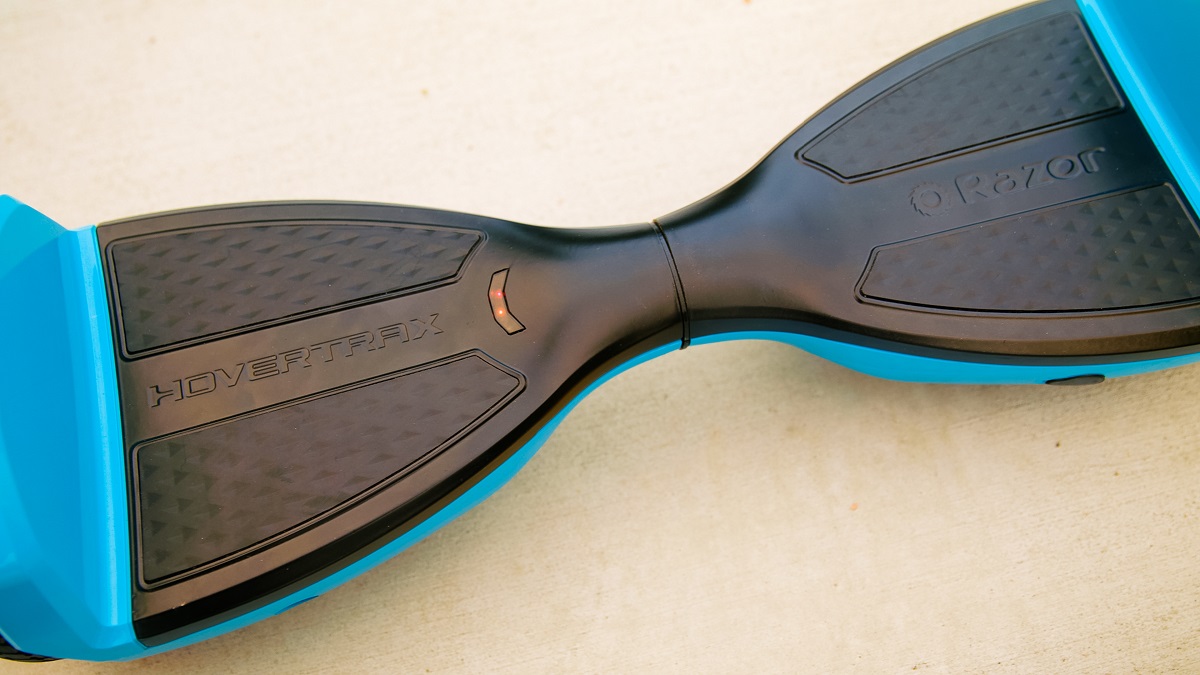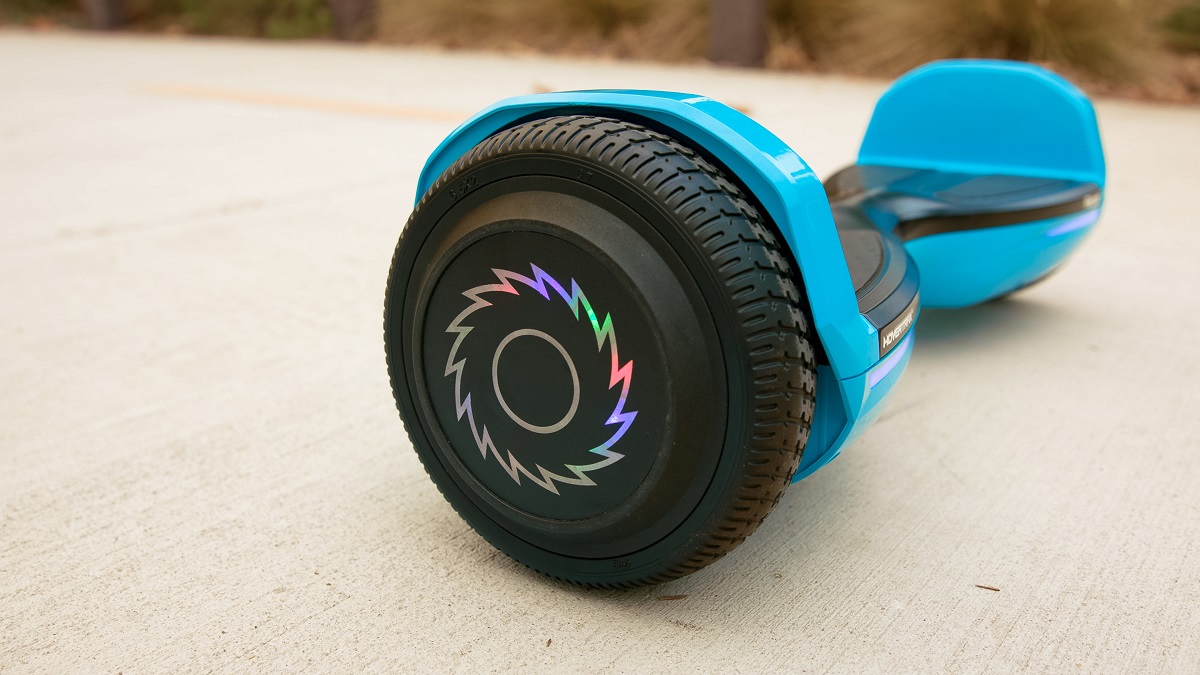It’s no secret hoverboards are a continuing craze in mobility devices and alternative transportation, but skateboards they are not. The hoverboard is its own creation, and although it may share a few similarities to an electric scooter or skateboard, it deserves its own category. Though they have similar structures complete with a footboard and wheels, that’s where the similarities end. Hoverboards are two-wheel, self-balancing vehicles with independently movable spot placement sections. That’s the patent description as originally issued in May 2014 for inventor Shane Chen. Razor now holds exclusive rights to this patent and Chen’s creation, the Hovertrax, to offer people the best-quality product straight from the hoverboard OG. This hoverboard buying guide gives you the ins and outs of what factors to consider before deciding on the perfect one.
First, before buying a hoverboard, you’ll want a general sense of how they work. Sure, they look cool, but you’ll want to check if you or the person you’re buying it for will be able to operate successfully. Don’t worry, we’re pretty certain you will. A hoverboard is controlled solely by the rider’s feet moving at angles relative to the ground. There are no external stabilizers, brakes, steering wheels of any kind.
When the Hovertrax is on, the gyroscopic mechanized balancing feature works to keep the foot platforms parallel to the ground. In simpler terms, this is what keeps you level when you’re standing still on the hoverboard. The hoverboard then detects changes from this position caused by how you shift the pressure of your feet, which will make the hoverboard move, spin, and stop. When you’re ready to move forward, press the toes on both of your feet downward. To move backward, press heels on both feet downward. Turn by putting more downward pressure on the front side of the foot platform on the outside of the turn.
Once you’ve got starting and stopping down, you can spin in place by pushing downward on the front edge of one of the foot platforms while simultaneously pushing down on the rear edge of the other foot platform. Although you may be tempted to lean into your movements, especially at first, remember it’s the position of the feet only that makes the difference. Leaning too much in any direction can throw your body off balance and off the hoverboard. It may feel unnatural at first but soon you and the hoverboard will become one.

Hovertrax hoverboards are already calibrated when shipped but to ensure “level” status, it may need to be recalibrated once in awhile. Here’s how to do it:
The platforms will automatically self-balance themselves to the calibrated position when the hoverboard power is back on. It’s best to start slow and in wide, open spaces before attempting to accelerate to the maximum speed or take your ride into a crowd. It takes a few tries to get used to not having handlebars or brakes to assist you. No matter what, just remember it’s your feet that make things work. Once you get the hang of it, it’s time to get rolling.
When buying a hoverboard, consider the rider who you’re buying it for. After all, different models go different speeds, some have extra features, and then, there is the cost to think about as well. Let’s review each of these factors more in-depth to help you narrow down your choice.
Most hoverboard models are recommended for riders ages 8 and up. Rider recommendation is also based on physical size, maturity, and skill level. This means that it may not be suitable for every kid (or adult!) who thinks they’re ready to ride. Because a hoverboard is a motorized mobility system, there are risks some children aren’t quite ready to handle or will still need adult supervision to operate.
The maximum weight limit for the Hovertrax DLX 2.0 and the Hovertrax 2.0 is 225 lbs. and 175 lbs. for the Hovertrax 1.5 model. Anything over the maximum weight can cause the hoverboard to malfunction and can put you at risk. This is something to consider if you’re factoring in wearing a backpack or carrying a bag. However, even with these weight limits, there should only be one rider at a time. There’s no room for two sets of feet on the hoverboard, and more importantly, it’s not safe. Too much weight affects the battery and throws the whole thing off balance, which leads to a greater risk for injury.
With regards to speed, the Hovertrax DLX 2.0 is the fastest model, going a maximum speed of up to 9 mph. The Hovertrax 2.0 and Hovertrax 1.5 aren’t far behind though at 8 mph max speed and 6 mph max speed, respectively. Although these are the speeds the hoverboards are capable of operating at, there’s a limit on how fast a person should ride. It’s based on individual comfort levels and where you’re riding. For example, it’s likely easier to reach higher speeds when someone has had months of practice and is riding in an empty lot versus a child new to riding a hoverboard who’s trying to navigate a more congested area.
Choose a hoverboard with long battery life for longer, uninterrupted fun. All Hovertrax models have a hoverboard battery life of at least 45 minutes, and the DLX 2.0 and 2.0 versions can last up to an hour; although, constant stops and starts may shorten ride time. This gives riders plenty of time to cruise through the park, joyride around the neighborhood, or commute to school or work nearby. In order to keep everything in excellent working condition, charge the battery after every ride. The battery is the lifeblood of your hoverboard. Without it, you’re literally going nowhere.
Even if the hoverboard is for a child, charging batteries is an adults-only job for safety concerns. The charger must be unplugged and disconnected when not in use. Make sure the power switch is turned off when you’re not riding the hoverboard. If it’s left on for an extended period of time, the battery may no longer hold a charge. Choose a clean, dry location in room-temperature that’s away from direct sunlight, flames, or sparks to charge the battery. Thorough battery care is essential to ensure safe rides time and time again.
Once you’ve compared age, rider weight, speed, and battery longevity, think about which one will fit your personality, or the personality of whoever will be riding it, the most. Read through customer hoverboard reviews to help with the decision-making process and see which features people like best. There are three Razor models to choose from: the Hovertrax 1.5, 2.0, and DLX 2.0. Each is built with the same care following the same original patent, but there are key differences that set them apart.
Hoverboard prices can range quite significantly. The MSRP for Hovertrax models is either $299.99 for the 1.5 and 2.0 versions and $559.99 for the Hovertrax DLX 2.0. You’ll always receive free shipping and be protected under the manufacturer warranty. However, for convenience, there are several authorized online and in-store retailers, such as Amazon, Walmart, and Target, that also sell hoverboards.
Many times, these are sold at a lower cost than the original MSRP because of store sales, used models, or other offers based on retailer preference. Whenever you buy from a third-party seller, confirm it’s shipped or sold by a verified retailer. You’ll follow the specific shipping, return, and replacement policies each of these stores have in place.
With every great innovation, there’s always a few that try to match the same greatness but with less. There are several, off-brand, patent-infringing products on the market. They are cheaper and lower quality products and many do not include the appropriate safety certifications, such as the UL certification. Don’t compromise quality for cost when buying a hoverboard. Yes, some models on the market may be cheaper, but that doesn’t mean they’re durable or even safe.

Razor was the first U.S. brand to receive the UL 2272 listing for electrical system safety. Typically, knock-off hoverboard brands have weaker batteries and flimsier frameworks. Plus, they do not have the EverBalance® auto-self-balancing or gyro-sensor technologies. Invest in a hoverboard that maintains a high standard of quality, safety, and customer approval.
Speaking of hoverboard safety, before you take off down the street, make sure you’ve got the basics covered. Nothing ruins a good time faster than an injury or accident. Always do a quick check of your hoverboard before riding to ensure everything is functioning properly. Check the tires and footboard for damage. Make sure the battery is fully charged. Here are a few other safety rules to keep in mind and share with anyone who’s getting ready to ride.
Wearing the right safety attire is non-negotiable for any rider. A secured helmet with a fastened chin strap is a must. Knee pads and elbow pads aren’t a bad idea either, especially as a beginner rider. Also, never ride the hoverboard without wearing sturdy shoes with shoelaces tied. Bare feet and hoverboards are never a good mix.
Riding a hoverboard isn’t a passive activity. It’s up to you to be aware of your environment and observant of your surroundings for animals, pedestrians, and other riders who may jet out in front of you or block your path in other ways. Avoid these obstacles as much as possible and be alert to potential hazards.
Lessen your chances of a wipeout by riding on dry, clean, and smooth pavement. Skip the wet, slick, or uneven paths. Don’t ride through mud, ice, or water puddles as this could cause damage to your quality hoverboard. Choose areas with enough open space for you to ride without too much traffic. It’s more fun and safer for everyone.
Being a speed demon is cool, but protecting your limbs is cooler. Not everyone is going to be at the same skill or comfort level. Go at your own pace. The more difficult you make the ride, the greater the risk of injury. While it might be nice to go faster and perform tons of turns, ride along at a slower speed first and get used to having the hoverboard underneath your feet.
There you have it – a comprehensive hoverboard buying guide focusing on all the important factors to consider. Taking time to compare options and review everything there is to know will help you feel more confident with your choice. Now you know how to choose a quality hoverboard that’s appropriate for the person it’s for based on the age, weight, and skill level involved. Think about the shelf-life of the battery and the style that will really make the person on the receiving end truly excited. After that, it’s time to make the final decision, strap on a helmet, and go!
Sources:
https://docs.google.com/viewer?url=patentimages.storage.googleapis.com/pdfs/US8738278.pdf;